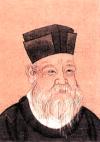Zhu Xi poet from China was born on October 18, 1130, had 69 years and died on April 23, 1200. Poems were written in mainly in Chinese language. Dominant movement is chinese dynasties.
Biography
Zhu Xi or Chu Hsi (Chinese: 朱熹, October 18, 1130 – April 23, 1200) was a Song Dynasty Confucian scholar who became the leading figure of the School of Principle and the most influential rationalist Neo-Confucian in China. His contributions to Chinese philosophy including his assigning special significance to the Analects of Confucius, the Mencius, the Great Learning,and the Doctrine of the Mean (the Four Books), his emphasis on the investigation of things (gewu), and the synthesis of all fundamental Confucian concepts, formed the basis of Chinese bureaucracy and government for over 700 years.
Zhu Xi, whose family originated in Wuyuan County, Huizhou (in modern Jiangxi province), was born in Fujian, where his father worked as the subprefectural sheriff. After his father was forced from office due to his opposition to the government appeasement policy towards the Jurchen in 1140, Zhu Xi received instruction from his father at home. Upon his father's death in 1143, he studied with his father's friends Hu Xian, Liu Zihui, and Liu Mianzhi. In 1148, at the age of 19, Zhu Xi passed the Imperial Examination and became a presented scholar. Zhu Xi's first official dispatch position was as Subprefectural Registrar of Tong'an (同安縣主簿), which he served from 1153 - 1156. From 1153 he began to study under Li Tong, who followed the Neo-Confucian tradition of Cheng Hao and Cheng Yi, and formally became his student in 1160. In 1179, after not serving in an official capacity since 1156, Zhu Xi was appointed Prefect of Nankang Military District (南康軍), where he revived White Deer Grotto Academy (白鹿洞書院). and got demoted 3 years later for attacking the incompetency and corruption of some influential officials. There were several instances of receiving an appointment and subsequently being demoted. Upon dismissal from his last appointment, he was accused of numerous crimes and a petition was made for his execution. Even though his teachings had been severely attacked by establishment figures, almost a thousand brave people attended his funeral. In 1208, eight years after his death, Emperor Ningzong of Song rehabilitated Zhu Xi and honored him with the posthumous name of Wen Gong (文公), meaning “Venerable gentleman of culture”. Around 1228, Emperor Lizong of Song honored him with the posthumous noble titleDuke of (State) Hui (徽國公). In 1241, a memorial tablet to Zhu Xi was placed in the Confucian Temple at Qufu, thereby elevating him to Confucian sainthood. Today, Zhu Xi is venerated as one of the "Twelve Philosophers" (十二哲) of Confucianism. Modern Sinologists and Chinese often refer to him as Zhu Wen Kung (朱文公) in lieu of his name.
During the Song Dynasty, Zhu Xi's teachings were considered to be unorthodox. Rather than focusing on the I Ching like other Neo-Confucians, he chose to emphasize the Four Books: the Great Learning, the Doctrine of the Mean, theAnalects of Confucius, and the Mencius as the core curriculum for aspiring scholar officials. For all these classics he wrote extensive commentaries that were not widely recognized in his time; however, they later became accepted as the standard commentaries. The Four Books served as the basis of civil service examinations up until 1905, and education in the classics often began with Zhu Xi's commentaries as the cornerstone for understanding them.






